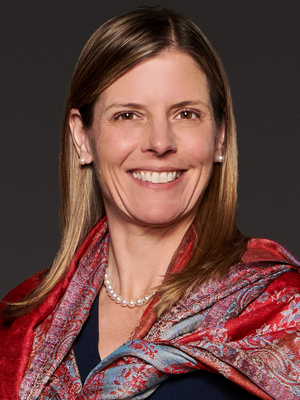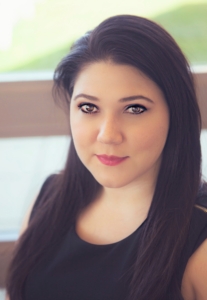 “Part of a leadership vision includes incorporating a learning curve in how you get there. None of us are always right and we’re all going to make mistakes as we go along,” says Kelley Conway. “But the objective is still the right objective. You’ve got to move and learn along the way how to best make it where you want to go.”
“Part of a leadership vision includes incorporating a learning curve in how you get there. None of us are always right and we’re all going to make mistakes as we go along,” says Kelley Conway. “But the objective is still the right objective. You’ve got to move and learn along the way how to best make it where you want to go.”
The Reward of Impact
With a love for science and math, Conway studied chemical engineering before opting against a PhD and career path that she feels wouldn’t have fit her. Animated by interaction, problem-solving and dynamic impact, she found herself drawn to consultancy in tech strategy. Picking up an MBA, she then moved into digital transformation in financial services.
After twenty years of consulting a wide variety of top-tier clients, Conway was ready to steward her strategic work through to impact, recruited to lead the charge on accelerating digital strategy at Northern Trust in Chicago in January 2021. She appreciated the ability to sit down with Chairman and CEO Michael O’Grady and co-create the vision for her role: “That’s how it ended up a as a corporate and digital strategy role. Because we saw that you can’t really separate those anymore.”
Conway considers the move her best career decision to date and a culmination of everything she’s done so far.
“Nobody can look at their life and say every single day they get up in the morning radiant, right? That’s just a lie,” she half-jokes. “But even if I’m in a funk, I feel better going to work. I can feel the excitement, movement and momentum in leading impact with the talent all around me.”
“Digital For a Purpose”
With her consulting background, Conway has put a framework around the amorphous concept of “digital” to create “digital for a purpose” and drive outcomes. She defines the five layers of digital as the user experience, insight & analytics, the data that serves as the linchpin to everything — the underlying platform including cloud, and the ways of working. The challenge is ensuring all these components work together to drive real outcomes.
Conway says that when Google Maps points out the “world’s biggest potato” when you’re on a road trip, that’s an outcome of AI insight built on massive data collection, making user specific connections to know you might want to see that potato. While we benefit from the end-user experience, most of us don’t understand all the invisible – and extensive – work that has created it.
She is specifically excited about leading the charge on a data modernization program that is “democratizing” data across Northern Trust. By applying a data mesh construct, she is helping make data accessible to end users where it can drive significant business outcomes. Now, more people are also thinking and talking the language of data in effective ways that will transform the business and help to partner with clients on the innovations that matter to them.
“One of the things I have learned during my career is that communicating progress to senior leadership is a key component of this journey, and candidly I’m still working on that,” says Conway. “You have to show people iterative outcomes so they know you’re building a vision that will take us to the future.”
Humility and Passion
Growing up outside of Pittsburgh, Conway’s parents were blue collar workers in the steel mill. She learned the value of hard work, being practical and moving with humility as you put energy behind your vision. One form of humility she learned was maximizing the resources at your disposal while you have them.
“Consider the macro-economic environment we’re living in right now – high inflation and recession. Resources are always limited or going up and down,” notes Conway. “So how can you be practical? How can you actually prioritize to get the most out of the resources?”
Another form of humility is staying surrounded by people that are more knowledgeable than you in their field of expertise.
“I want people around me who know more and can see different things. The amount that I know is a lot less than the amount that I don’t know,” says Conway. “That diversity of thought and knowledge gets us to better solutions.”
Conway is genuinely passionate about tech, and conveys a sincere belief in the power of technology to transform organizations.
“Sometimes leadership requires seeing a path, charting the path and having the confidence to take that path. Sure it might be risky but we’re convinced it will accelerate our progress,” says Conway. “As a leader, my job is to communicate that vision with enthusiasm and authenticity, supported by leadership and an amazing team.”
She’s a big fan of taking measured risks amidst uncertainty of outcome, because the alternative is not learning and not growing: “You may not know if this is going to work, but you can see it’s the best thing you can try. And if you don’t try, you don’t get anything,” notes Conway.
Leveraging Your Difference
When Conway made partner at the consulting firm years ago, a junior woman told her she was an inspiration, which both surprised and emboldened her.
“I’ve now taken that in two directions. One is I recognize the broader responsibility and think about how to help individuals succeed. And secondly, I take advantage of that uniqueness in the room, and that confidence is something that has come with experience and wisdom.”
Conway has three children, 17 and 15 year old sons and a 2 1/2 year old daughter. With a form of dwarfism called achondroplasia, her oldest son is 4’6”. She’s always told him that he will not go unnoticed in the world, so he can futilely try to blend into the woodwork or he can leverage the opportunity of his uniqueness to move forward. Early on, she was also the woman in tech in the corner trying to blend in, when that was always impossible. Now, she’s embraced owning her difference to get her message across stronger.
On the note of leaning into your voice, Conway says her little girl has “a will on her like nobody’s business” which she takes pride in: “She’s impossible and stubborn and I refuse to squash that,” says Conway, “because I know exactly what she’s going to face in her life and I want that to be there.”
Her approach to working motherhood has evolved. When her sons were little, she put her career above everything and their dad was highly supportive. At that time, she believed she had to choose family or career. With her little daughter now, her approach has changed.
“I prioritize making time with her more, yet I still have the same passion for my career. I’m still making the change I want. I realized you can actually find balance,” says Conway, who comes into the office early and leaves early. “There are trade-offs, but it’s not that you can either have this or that. I have an incredibly supportive team and I’ve learned to take a much more balanced view of my life.”
Leadership that Inspires and Empowers
“I am very much a believer in leaders who empower their teams versus control their teams. I don’t appreciate command-and-control leaders. That stifles innovation and digital and everything I love,” says Conway. “I’ve had managers who are caring and give you all the room in the world and that helped me.”
Aspiring to lead that way, she also looks for the traits of humility and empowering others in the people she will work with. Conway recalls she had the opportunity to inspire and empower her team.
While there was hesitation around whether they had the talent in place as they set off into data modernization, she could see the potential in the talent already there. So she focused on bringing the team into the vision, animating them in learning and developing team passion around it. She saw her job as removing the roadblocks and then watching as her team moved faster than she had imagined. In general, Conway has many times heard from others that the problem is too complex, but she’s not one to “pack her bags and go home” just because things are difficult and it’s going to take innovative team approaches to navigate the terrain.
Climbing Higher
Conway underlines the importance of agency amidst requests for support: “I’m a big believer that you control your own destiny. People will support you, but you have to also take those opportunities and drive your career. You have an onus to take responsibility for your career as much as the onus on those around you to support you.”
Conway is an avid mountaineer, although she is pausing on that activity until her daughter is a bit older. She’s climbed Mont Blanc, Mount Ararat and Mount Kilimanjaro. She’s ice-climbed in Patagonia and broken 20,000 feet in Nepal, having gone to Everest base camp and Mount Mera. She is eyeing the challenge of Aconcagua in Argentina.
When climbing, she says, “everything shuts off. You’re working towards a goal. Sometimes it’s a slog, but you pick your head up and it’s this amazing spiritual sensation,” she muses. “That’s what rejuvenates me. A career can provide that same experience. Digital modernization can be a long, incremental process, so you have to stop sometimes and appreciate the amazing progress you’ve made.”
By Aimee Hansen


